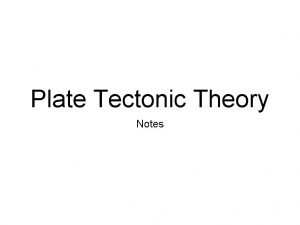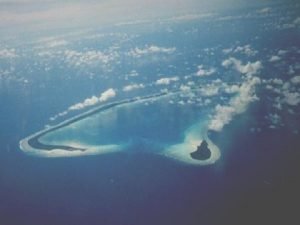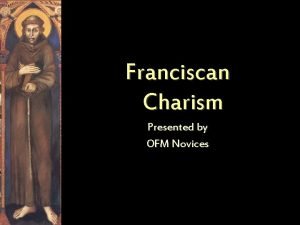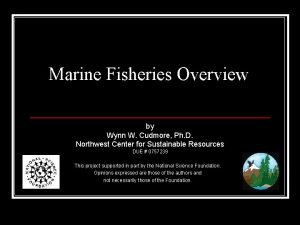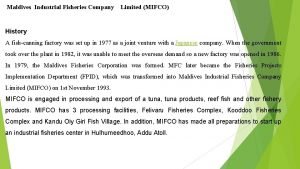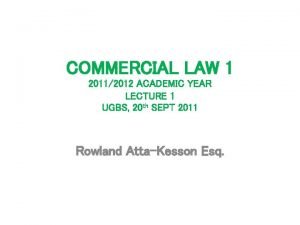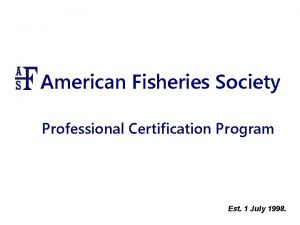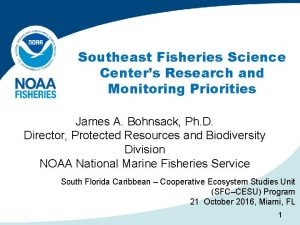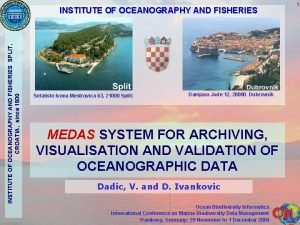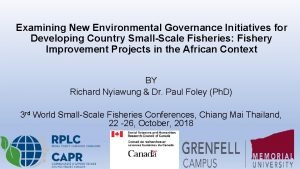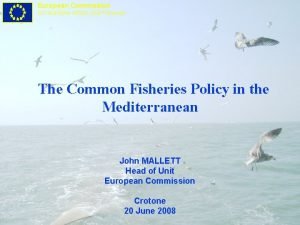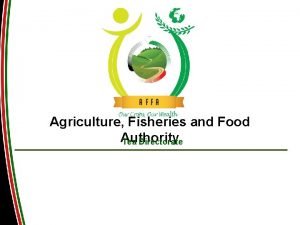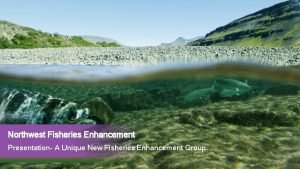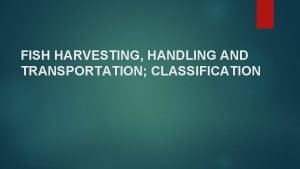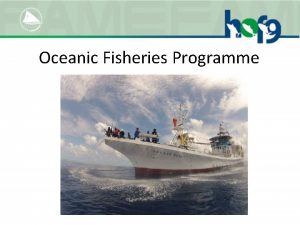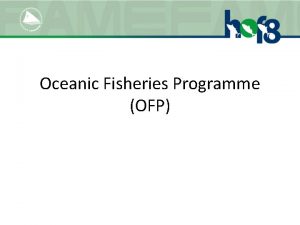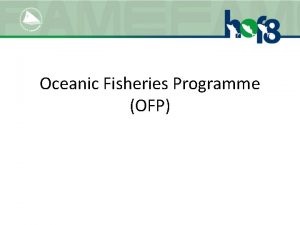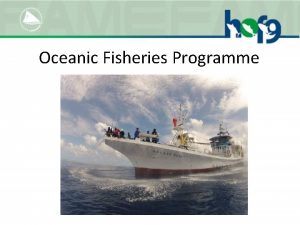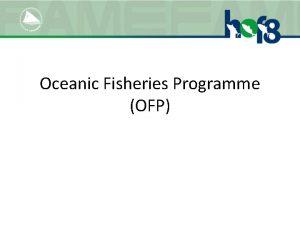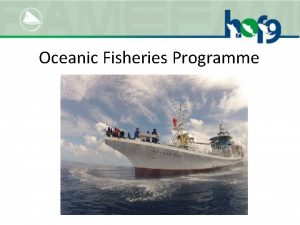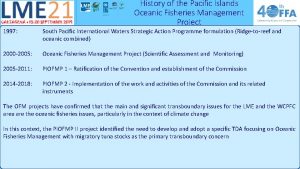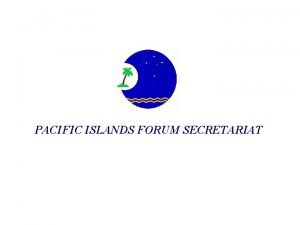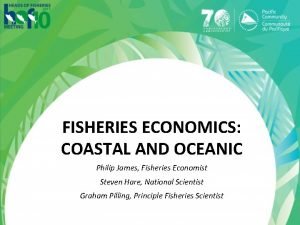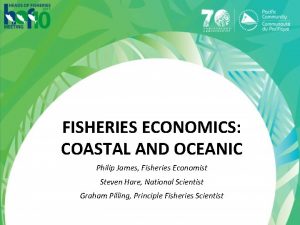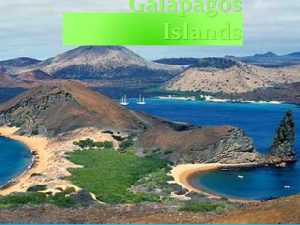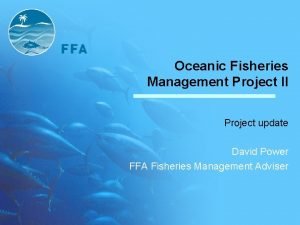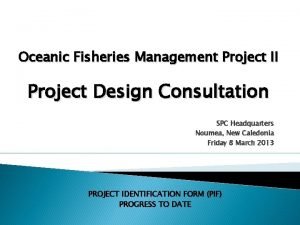Pacific Islands Oceanic Fisheries Management Project OFM Project
















- Slides: 16

Pacific Islands Oceanic Fisheries Management Project (OFM Project) Transform Aqorau Deputy Director General, FFA The Global Environment Facility Biennial International Waters Conference July 31 – August 3 2007, Cape Town, South Africa 4 th

Strategic Action Programme of the Pacific Small Island Developing States (SAP) Goal: Integrated sustainable development and management of International Waters Priority Concerns: Degradation of water quality Degradation of associated critical habitats Unsustainable use of resources Imminent Threats/ Proximate Root Causes Pollution from land-based activities Modification of critical habitats Unsustainable exploitation of resources Ultimate Root: Causes Management deficiencies a) governance b) understanding Solutions: Integrated Coastal and Watershed Management Oceanic Fisheries Management

IMPLEMENTING SUSTAINABLE WATER RESOURCES AND WASTEWATER MANAGEMENT RESOURCES AND IN PACIFIC ISLAND COUNTRIES l The Pacific SAP is comprised of one OFM and one IWRM component and GEF is supporting the implementation of both l The GEF Pacific IWRM Project is implemented by SOPAC will run for five years to 2013 l UNDP component ($6. 1 M from GEF): ¡ On-the-ground demonstration activities on IWRM & Water-use Efficiency (WUE) initiated in 13 PICs ($6. 1 M) l UNEP Components ($2. 1 M from GEF): ¡ IWRM & WUE frameworks ¡ Policy, legislative and institutional reform for IWRM & WUE (funded by EU) ¡ National and regional capacity building

IWRM Demonstration Activities 1. Watershed Management - e. g. Federated States of Micronesia - Ridge to Reef: Protecting Water Quality from Source to Reef in FSM 2. Wastewater Management – e. g. Tuvalu – Ecosan 3. Water Resources Assessment & Protection -e. g. Cook Islands – Integrated freshwater and coastal management on Rarotonga 4. Water Use Efficiency & Water Safety - e. g. Tonga - Improvement and Sustainable Management of Nieafu Aquifer Groundwater Resources in Vava'u Islands

OFMP Outline l 15 participating Pacific SIDS l 5 year life (commenced October 2005) l Financed by $10. 9 m GEF Grant l Executed by UNDP l Implemented by FFA with SPC, IUCN and WWF

OFMP Goals The global environmental goal of the Project is to achieve global environmental benefits by enhanced conservation and management of transboundary oceanic fishery resources in the Pacific Islands region and the protection of the biodiversity of the Western Tropical Pacific Warm Pool Large Marine Ecosystem. The broad development goal of the Project is to assist the Pacific Island States to improve the contribution to their sustainable development from improved management of transboundary oceanic fishery resources and from the conservation of oceanic marine biodiversity generally.

OFMP Structure Component 1, the Scientific Assessment and Monitoring Enhancement Component, (SPC) ¡improved scientific information and knowledge ¡strengthening the national capacities of Pacific SIDS in these areas. Component 2, the Law, Policy and Institutional Reform, Realignment and Strengthening Component, (FFA) assisting Pac SIDS to: ¡ participate in the new WCPF Commission ¡reform, realign and strengthen their national laws, policies, institutions and programmes Component 3, PCU and awareness raising

Geographic Context

Outcomes Pilot Phase l WCPF Convention concluded with Pacific SIDS participation l Commission Rules prepared including limits on meetings and full funding for all 15 Pacific SIDS to all meetings of the Commission and its subsidiary bodies, including Technical Working Groups

Outcomes Scientific Assessment and Monitoring Enhancement Component l Development of monitoring programmes in all Pacific SIDS with data now flowing into target species stock assessments and ecological risk assessments l A focus on stock assessment capacity building and support for national EAFM analyses following funding of core stock assessment tasks by the Commission l Assessment of the role of seamounts in oceanic pelagic fisheries and impacts of seamounts on oceanic biodiversity being undertaken l Completion of the first phase of the Pacific Tuna Tagging Programme l Development of trophic structure models l Use of ecosystem models used to test management options and assess impacts of some climate change scenarios

Law, Policy and Institutional Reform, Realignment and Strengthening Component l Commission is established with all Pacific SIDS having ratified the Convention l Comprehensive monitoring and compliance programme established, based largely on Pacific SIDS in-zone programmes including ¡ 9, 400 vessels on the Vessel Record ¡ High seas boarding & inspection is operational ¡ 2, 200 vessels registered to report to the High seas VMS serviced by the FFA ¡ 500 Pacific Island Onboard observers projected to be deployed in 2010 ¡ IUU list l This programme establishes several global precedents for high seas l Commission data and science programmes funded from the Commission budget serviced by SPC l Preliminary catch or effort caps in all major fisheries with initial mitigation measures for sharks, seabirds and turtles l Law and policy reforms undertaken in almost all Pacific SIDS, l EAFM analyses for management policy reforms undertaken for most Pacific SIDS using risk assessment approach developed under the Project


Shortfalls l Seamount-related activities were initially set back by lack of research vessel l Collaboration with industry has been disturbed by the constraints at the regional industry association l The national consultative committees have not functioned effectively l Currency fluctuations have reduced the real value of project funding (balanced by increased co-financing) l More work on national implementation is required, especially in smaller SIDS l Inadequate priority on awareness raising

Lessons Learned l Small developing countries, working together, can make a difference l Limits are good for business - regional conservation measures and resource protection programmes have improved the private investment climate in oceanic fisheries l Long term investments in science and data pay off l Monitoring and control programmes create attractive jobs l The PCU and outreach functions have been under-resourced l There is a critical need for long-term capacity building which is beyond the scope of the Project and GEF funding l National capacities are the over-riding limit on what can be achieved

Phase II Proposal l MTR recommended a second phase l Shift to making existing measures work at national level, rather than adopting more measures l Focus on smaller SIDS l Address the impact of climate change l Invest more in knowledge management l Streamline national consultative processes

THANK YOU
 Convergent oceanic oceanic plate boundary
Convergent oceanic oceanic plate boundary Oceanic oceanic convergent boundaries
Oceanic oceanic convergent boundaries Piccap
Piccap Franciscan charism
Franciscan charism Ofm
Ofm Ofm per diem
Ofm per diem Fisheries management
Fisheries management Mifco logo
Mifco logo Buaful v construction pioneer
Buaful v construction pioneer American fisheries society certification
American fisheries society certification Southeast fisheries science center
Southeast fisheries science center Split institute of oceanography and fisheries
Split institute of oceanography and fisheries Small-scale fisheries
Small-scale fisheries Dg maritime affairs and fisheries
Dg maritime affairs and fisheries Agriculture fisheries and food authority
Agriculture fisheries and food authority Northwest fisheries
Northwest fisheries Handling and transportation of fish
Handling and transportation of fish

